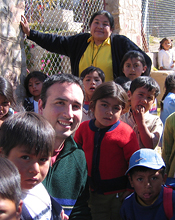Ensuring the rotavirus vaccine works better
By Kay Torrance and Pam Auchmutey

Rollins researcher Juan Leon sees reducing malnutrition as key to improving rotoavirus vaccine response for this young child and others in Bolivia. Photo by Kay Hinton
At a city hospital in Bolivia, mothers and their babies line up early in the morning and wait patiently to receive a free childhood vaccination against rotavirus. This common virus causes diarrhea severe enough to claim the lives of more than 590,000 children under age 5 worldwide each year. Most live in developing countries like Bolivia.
Since the Bolivian government introduced it in 2008, the rotavirus vaccine has yielded dramatic results overall, averting 6,400 hospitalizations and 500 deaths annually. But Juan Leon, a Rollins researcher who was born in Peru and lived in Bolivia as a teenager, believes the vaccine could be more effective. As studies show, vaccine efficacy ranges from 18% to 64% in low-income countries, compared with 77% to 98% in higher-income countries.
Researchers point to a number of possible reasons for the difference—chronic exposure to infections, maternal antibodies, or malnutrition, among others. In a country where a quarter of the population is malnourished and many more experience food insecurity, Leon sees reducing malnutrition as the key to improving vaccine response in Bolivia. Until now, no other researcher has looked at severe chronic malnutrition and vaccine efficacy, according to Leon.
|
|
"Whether we get positive or negative results, this study can inform policy," says Paulina Rebolledo, an Emory infectious disease expert working with Leon on his study. "If it’s not nutrition, then we can turn our attention to something else. If there is a link, then Bolivia and other countries can look toward possibly implementing a booster or supplementing the vaccine with nutrition."
In an earlier study, Leon’s team examined the cost-effectiveness of rotavirus vaccination. His study proved that the vaccine was the best option compared with vitamin A, oral rehydration therapy, and other interventions to prevent diarrhea in young children.
"We shared the results with the government, and based on those arguments, Bolivian health officials decided to continue the free vaccination program through the end of 2017," says Leon. "Then we thought, ‘OK, what’s next?’ We still think the vaccine is the best intervention for reducing diarrhea to benefit the population. So how can we make the vaccine work better?"
Leon’s team is now following 400 mothers and infants, noting their nutritional intake and the babies’ height and weight over the course of a year. Preliminary findings show up to 20% of infants are chronically malnourished and up to 40% are anemic.
"The high prevalence of iron deficiency in infants at 6 months of age is troubling since this is a peak time of brain development and transition to oral foods, as well as increased risk for diarrhea and other infectious diseases," says Parminder Suchdev, associate professor of global health.
Since 2004, Leon has focused his research in Bolivia, largely because of his late parents. Both worked for UNICEF in several countries, including Bolivia, where his father developed successful programs to improve adult literacy, preschool education, water and sanitation, and food security. His mother empowered rural communities in Bolivia to develop preschool education programs, called Wawa-wasi, run by community women known as promotoras. Sadly, Leon’s mother died in a car accident following a training session for promotoras in rural Bolivia. The women she trained erected a statue in a small town to honor her work in educating Bolivian children.
"Our family has given much to Bolivia, and in turn, Bolivia has given much to our family," says Leon, who also has a sister. "Our team at Rollins aims to improve the health of Bolivian children, and through them, the health of children worldwide."
 |
||||

